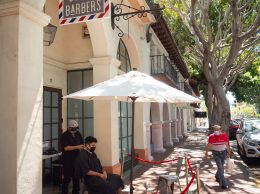Dubroff: Assessing the impact on tri-county economy
It might be the understatement of the new decade to say that the economics of coronavirus are not well understood.
That doesn’t help the hundreds of hotel and restaurant workers who’ve been laid off during a crisis that Acme Hospitality Group leader Sherry Villanueva described as “unprecedented and still unfolding” in a note explaining why she decided to close eight of Santa Barbara’s most successful eateries.
In an email, Matthew Fienup, who leads California Lutheran University’s economic forecasting center, said the U.S. stock market was rising during the past 15 months but the fundamentals were “eroding over that entire period.” To the extent a stock market has burst, at least some of the gains could be attributed to the Federal Reserve’s “policy of ultra-low interest rates.”
Here are some additional thoughts about how things may play out for California and the region.
• Helicopter money is in the mix. At press time it seems likely that most Americans will get something like $1,000 in direct payments from the U.S. Treasury, possibly in April and again in May. That’s hard to believe but something similar happened after the Sept. 11, 2001 attacks. Because the shutdown is likely to last more than two weeks, a second payment could be key to stopping a deeper economic slide.
• May is looking like a pivotal month. Most small businesses are bracing for the impact of shutting the economy down for the rest of March and most of April. But May is when the Central Coast’s tourism business comes alive and when the pace of home sales typically picks up. It is also a critical time for cities and counties that are heavily dependent on TOT taxes.
• If they truly want to head off permanent damage, Congress and the administration will have to bolster both banks and small businesses at the same time. The play book from the financial crisis won’t work because banks are well-capitalized. But small businesses will need help meeting payrolls and banks will need the flexibility to restructure loans or delay debt payments until things improve.
• These are times for painful choices. Villanueva, who forged her successful restaurant group in the wake of the Great Recession, called her decision to temporarily suspend Acme’s locations “the most difficult decision I’ve had to make as a business owner.” As an owner who had to cancel a Business Times event scheduled for March 12 at the last minute, I have some insight into how difficult that was.
• California will quickly find itself in a fiscal bind. Capital gains taxes are such a huge part of the state’s general fund that the bear market is “once again threatening to sink the budget.” The soaring cost of covering corona virus related costs, plus lost income taxes from layoffs could quickly exhaust California’s rainy day fund.
The great unknown is how long this all will last. A return to a “new normal” for economic activity — and rebounding stock market — could limit the damage to California’s fiscal position and put owners like Villanueva on track to resume their company’s growth trajectory.
Is that a realistic best-case scenario or just wishful thinking? That is a question everyone from the Treasury secretary to laid-off servers and hotel workers up and down the Central Coast would like to have an answer to.
Unfortunately, we’ll just have to wait.
• Contact Editor Henry Dubroff at [email protected].











